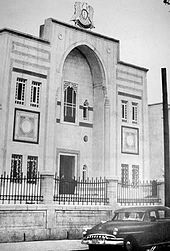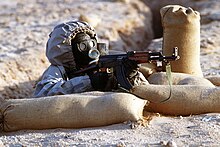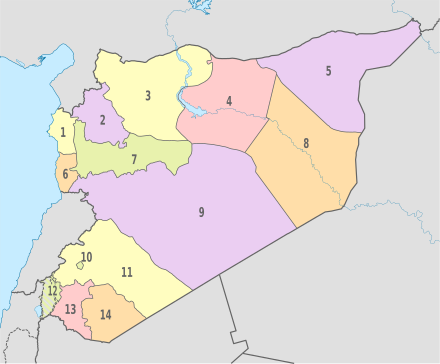Politics and government
Syria is formally a unitary republic. The constitution adopted in 2012 effectively transformed Syria into a semi-presidential republic due to the constitutional right for individuals to be elected which do not form part of the National Progressive Front.[101] The President is Head of State and the Prime Minister is Head of Government.[102] The legislature, the Peoples Council is the body responsible for passing laws, approving government appropriations and debating policy.[103] In the event of a vote of no confidence by a simple majority, the Prime Minister is required to tender the resignation of their government to the President.[104]
The executive branch consists of the president, two vice presidents, the prime minister, and the Council of Ministers (cabinet). The constitution requires the president to be a Muslim[105]but does not make Islam the state religion.
The constitution gives the president the right to appoint ministers, to declare war and state of emergency, to issue laws (which, except in the case of emergency, require ratification by the People's Council), to declare amnesty, to amend the constitution, and to appoint civil servants and military personnel.[106] According to the 2012 constitution, the president is elected by Syrian citizens in a direct election.
Syria's legislative branch is the unicameral People's Council. Under the previous constitution, Syria did not hold multi-party elections for the legislature,[106] with two-thirds of the seats automatically allocated to the ruling coalition.[107] On 7 May 2012, Syria held its first elections in which parties outside the ruling coalition could take part. Seven new political parties took part in the elections, of which Popular Front for Change and Liberation was the largest opposition party. The armed anti-government rebels, however, chose not to field candidates and called on their supporters to boycott the elections.
The President is currently the Regional Secretary of the Ba'ath party in Syria and leader of the National Progressive Frontgoverning coalition. Outside of the coalition are 14 illegal Kurdish political parties.[108]
Syria's judicial branches include the Supreme Constitutional Court, the High Judicial Council, the Court of Cassation, and the State Security Courts. Islamic jurisprudence is a main source of legislation and Syria's judicial system has elements ofOttoman, French, and Islamic laws. Syria has three levels of courts: courts of first instance, courts of appeals, and the constitutional court, the highest tribunal. Religious courts handle questions of personal and family law.[106] The Supreme State Security Court (SSSC) was abolished by President Bashar al-Assad by legislative decree No. 53 on 21 April 2011.[109]
The Personal Status Law 59 of 1953 (amended by Law 34 of 1975) is essentially a codified sharia.[110] Article 3(2) of the 1973 constitution declares Islamic jurisprudence a main source of legislation. The Code of Personal Status is applied to Muslims by sharia courts.[111]
As a result of the ongoing civil war, various alternative governments were formed, including the Syrian Interim Government, the Democratic Union Party and localised regions governed by sharia law. Representatives of the Syrian Interim government were invited to take up Syria's seat at the Arab League on 28 March 2013 and[16] was recognised as the "sole representative of the Syrian people" by several nations including the United States, United Kingdom and France.[112][113][114]
Human rights
The situation for human rights in Syria has long been a significant concern among independent organizations such as Human Rights Watch, who in 2010 referred to the country's record as "among the worst in the world."[115] The US State Department funded Freedom House[116] ranked Syria "Not Free" in its annualFreedom in the World survey.[117]
The authorities are accused of arresting democracy and human rights activists,censoring websites, detaining bloggers, and imposing travel bans. Arbitrary detention, torture, and disappearances are widespread.[118] Although Syria's constitution guarantees gender equality, critics say that personal statutes laws and the penal code discriminate against women and girls. Moreover, it also grants leniency for so-called 'Honour killing'.[118] As of 9 November 2011 during the uprising against President Bashar al-Assad, the United Nations reported that of the over 3500 total deaths, over 250 deaths were children as young as 2 years old, and that boys as young as 11 years old have been gang raped by security services officers.[119][120] People opposing President Assad's rule claim that more than 200, mostly civilians, were massacred and about 300 injured in Hama in shelling by the Government forces on 12 July 2012.[121]
In August 2013 the government was suspected of using chemical weapons against its civilians. US Secretary of State John Kerry said it was "undeniable" that chemical weapons had been used in the country and that President Bashar al-Assad's forces had committed a "moral obscenity" against his own people. "Make no mistake," Kerry said. "President Obama believes there must be accountability for those who would use the world's most heinous weapon against the world's most vulnerable people. Nothing today is more serious, and nothing is receiving more serious scrutiny".[122]
The Emergency Law, effectively suspending most constitutional protections, was in effect from 1963 until 21 April 2011.[109]It was justified by the government in the light of the continuing war with Israel over the Golan Heights.
In August 2014, UN Human Rights chief Navi Pillay criticized the international community over its "paralysis" in dealing with the more than 3-year old civil war gripping the country, which by April 30, 2014 had resulted in 191,369 deaths with war crimes, according to Pillay, being committed with total impunity on all sides in the conflict. Minority Alawites and Christiansare being increasingly targeted by Islamists and other groups fighting in the Syrian civil war.[123][124]
Military
The President of Syria is commander in chief of the Syrian armed forces, comprising some 400,000 troops upon mobilization. The military is a conscripted force; males serve in the military upon reaching the age of 18.[125] The obligatory military service period is being decreased over time, in 2005 from two and a half years to two years, in 2008 to 21 months and in 2011 to year and a half.[126] About 20,000 Syrian soldiers were deployed in Lebanon until 27 April 2005, when the last of Syria's troops left the country after three decades.[125]
The breakup of the Soviet Union—long the principal source of training, material, and credit for the Syrian forces—may have slowed Syria's ability to acquire modern military equipment. It has an arsenal of surface-to-surface missiles. In the early 1990s, Scud-C missiles with a 500-kilometer range were procured from North Korea, and Scud-D, with a range of up to 700 kilometers, is allegedly being developed by Syria with the help of North Korea and Iran, according to Zisser.[127]
Syria received significant financial aid from Persian Gulf Arab states as a result of its participation in the Persian Gulf War, with a sizable portion of these funds earmarked for military spending.
Foreign relations
Ensuring national security, increasing influence among its Arab neighbors, and securing the return of the Golan Heights, are the primary goals of President Bashar al-Assad's foreign policy. At many points in its history, Syria has seen virulent tension with its geographically cultural neighbors, such as Turkey, Israel, Iraq, and Lebanon. Syria enjoyed an improvement in relations with several of the states in its region in the 21st century, prior to the Arab Spring and the Syrian civil war.
Since the ongoing civil war of 2011, and associated killings and human rights abuses, Syria has been increasingly isolated from the countries in the region, and the wider international community. Diplomatic relations have been severed with several countries including: Britain, Canada, France, Italy, Germany, Tunisia, Egypt, Libya, the United States, Belgium, Spain, and the Gulf States.[128]
From the Arab league, Syria continues to maintain diplomatic relations with Algeria, Egypt, Iraq, Lebanon, Sudan andYemen. Syria's violence against civilians has also seen it suspended from the Arab League and the Organisation of Islamic Cooperation in 2012. Syria continues to foster good relations with her traditional allies, Iran, China, Venezuela and Russia, who are among the few countries which have supported the Syrian government in its conflict with the Syrian opposition.
Syria considers the Hatay Province of Turkey as part of its own territory.[129]
Israel unilaterally annexed the Golan Heights in 1981, although the Syrian government continues to demand the return of this territory.
The Syrian occupation of Lebanon began in 1976 as a result of the civil war and ended in April 2006 in response to domestic and international pressure after the assassination of former Lebanese Prime Minister, Rafik Hariri.
Syria is included in the European Union's European Neighbourhood Policy (ENP) which aims at bringing the EU and its neighbours closer.
Administrative divisions
Syria is divided into 14 governorates, which are sub-divided into 61 districts, which are further divided into sub-districts.
| No. | Governorate | Capital | |
|---|---|---|---|
| 1 | Latakia | Latakia | |
| 2 | Idlib | Idlib | |
| 3 | Aleppo | Aleppo | |
| 4 | Al-Raqqah | Al-Raqqah | |
| 5 | Al-Hasakah | Al-Hasakah | |
| 6 | Tartus | Tartus | |
| 7 | Hama | Hama | |
| 8 | Deir ez-Zor | Deir ez-Zor | |
| 9 | Homs | Homs | |
| 10 | Damascus | – | |
| 11 | Rif Dimashq | – | |
| 12 | Quneitra | Quneitra | |
| 13 | Daraa | Daraa | |
| 14 | Al-Suwayda | Al-Suwayda |
Internet and telecommunications
The Telecommunications in Syria are overseen by the Ministry of Communications and Technology. In addition, Syrian Telecom plays an integral role in the distribution of government internet access. The Syrian Electronic Army serves as a pro-government military faction in cyberspace and has been long considered an enemy of the hacktivist groupAnonymous.[132] Because of internet censorship laws, 13,000 internet activists have been arrested between March 2011 and August 2012.






0 comments:
Post a Comment